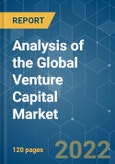Global Venture Capital Market deal-making has continued to grow, hitting record highs amid the COVID-19 pandemic. Although there was an initial pause in investing from March to May of 2020, investors have been pumping in money not only to support struggling portfolio companies but also to invest in new deals, particularly in later-stage information technology and healthcare concerns. The market also saw an uptick in special purpose acquisition companies (SPACs) and sponsor-backed private investment in public equity (PIPE) deals when the traditional publicly traded financing markets were less available. This was primarily due to the cost-effectiveness of these transactions and the speed of execution.
The size of the global venture capital industry has been increasing throughout all three stages - angel/seed, early, and late. Seed capital refers to the first round of funding, which is used to cover initial operating expenses and often comes from the founders' own personal assets. Startups can also be supported by so-called angel investors - wealthy individuals who invest smaller amounts of money and at an early stage.
500 Startups, an early-stage venture fund and seed accelerator based in California assisted in 139 angel/seed stage deals in 2019. The backing from venture capitalists seems to bear fruits in certain parts of the world. For instance, alone in the U.S., over 30 billion U.S. dollars were generated by IPOs from venture capital-backed companies in 2020.
Key Market Trends
Distribution of Start-Ups Witnessing Venture Capital Industry Globally
In 2020, 61% of super start-ups across the world offered B2B solutions, whereas the other 39 percent offered B2C solutions. B2C and B2B are both forms of commercial transactions. B2C stands for business-to-consumer and is a process for selling products or services directly to consumers. On the other hand, B2B stands for business-to-business and is a process for selling products or services to other businesses.
Countries Increasing Start-ups Rate is Boosting the Venture Capital Market Globally
Highly valued startups are known as unicorns, which is a reference to their elusiveness. China and the United States have the highest number of unicorns worldwide but are one of the most active regions for startups in Latin America. Meanwhile, a smaller percentage of the population of South Korea and India are involved in startups.
As of April 2020, the most valuable startup worldwide was the Chinese tech company Ant Group, previously known as Ant Financial. Most of the highest valued unicorns globally hail from either China or the United States. Although more than twice as many unicorns were headquartered in the United States. as were in China, the highest valued Chinese unicorns were worth almost twice as much as their United States counterparts.
Competitive Landscape
The Global Venture Capital Market is highly competitive across various countries, including the United States, England, and China, and growing in some regions of the globe, including the Netherlands, Vietnam, and others, offering a huge number of competitive players dominating the Market, nowadays grabbing Market more powerfully by the new innovations and partnership with the foreign venture capital players yielding opportunities to the Market. Thus it has made the Global Venture Capital Market very competitive and strong. Many of these platforms were originally start‑ups that evolved into mature businesses, while others were created by (or with the support of) key players in the field, such as Wealth and Asset management firms, or with collaboration with private equity companies. When it comes to overseeing existing portfolio companies, venture capital and private equity funds are working closely as partners with management to help navigate through the disruption. Strategies include categorizing portfolio companies into different buckets based on their financial performance, identifying any resources and liquidity needs, and then helping them procure funds, either in the form of capital infusion or external funding (such as bridge financing). Many firms, including NEA, Tiger Global, and IDG Capital, are leading Global Venture Capital Market to new heights and are expected to grow throughout the forecasted period.
Additional Benefits:
- The market estimate (ME) sheet in Excel format
- 3 months of analyst support
This product will be delivered within 2 business days.
Table of Contents
Companies Mentioned (Partial List)
A selection of companies mentioned in this report includes, but is not limited to:
- Tiger Global Management
- New Enterprises Associates
- Sequoia Capital
- DST Global
- IDG Capital
- Index Ventures
- Healthcare Royalty Partners
- GGV Capital
- Nanjing Zijin Investment
- Greylock Partners*










